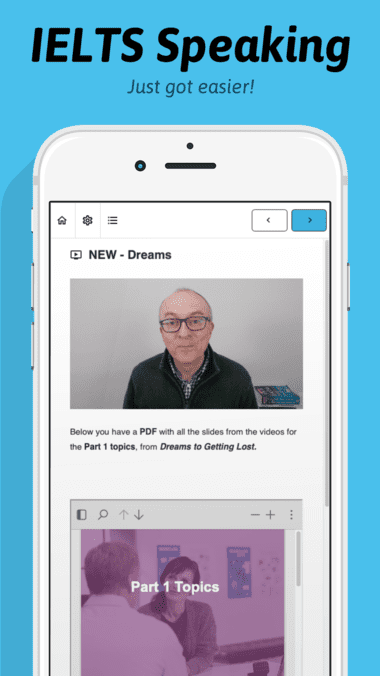
Introduction
In this free IELTS Speaking lesson we look at the most common questions you have about IELTS Speaking.
We also look at the best websites and podcasts you can use to help you prepare for the test.

Keith O'Hare
Trinity Dip TESOL, MSc Digital Education (U.K.) A lover of languages, teaching and lasagna!
What you will Learn
Websites to help prepare for IELTS
These are websites that many of you are using and that I would recommend for different aspects of IELTS. For more details watch the full video of this live lesson.
- IELTS Advantage
- IELTS Speaking for Success Podcast
- BBC Learning English
- E2 Language
- MyIELTS Classroom
- IELTSLiz
- British Council
- IELTS Simon
- Academic English Help
- Read Theory
- Ted Talks
Podcasts to help prepare for IELTS
Here are 10 podcasts that you like and that I also recommend to listen to help you prepare for IELTS.
For ESL/EFL students
- Shelly Cornick’s podcasts
- All ears english, IELTS energy 7+,
- IELTS speaking for success by Rory and Maria
- Luke’s english podcast
- British council podcast
- 6 minutes English from BBC
For everybody (not aimed at students)
- BBC Outlook
- BBC Food chain
- BBC People fixing the world
- BBC Friday comedy night
- BBC Global News podcast
- Future tense from ABC Radio
- Michelle Obama’s podcast
- Radiotopia australia
- The TED interview
Students' questions about the IELTS Speaking test
What are the most common questions in IELTS speaking?
The most common questions for Part 1, can be found in my free online course – Crack IELTS Speaking Part 1
For Part 2, there is huge list of questions, so it might be easier to prepare by looking at some of the common topics. You can find some of these on my website here
For Part 3, you can find some of the most common questions at the bottom of this page about IELTS Speaking Part 3
How can we identify our speaking level at home?
Well, you can start to identify your level by using the IELTS Speaking Band Descriptors. These are publicly available here.
You can also find a simplified version with a simple explanation here.
Whilst many students are good at identifying their own weaknesses, they are not so good at assessing their own level.
I would recommend getting a qualified teacher to do this. Platforms like Cambly and iTalki are good for this.
Alternatively, you could do an online mock test. There are free ones here, but I am not sure of the quality
I recommend Take IELTS as I have taken a mock test and like the accuracy and quality of the feedback. I think it is good value for money.
You can get a 10% discount on all their test using the code: keith10
How can I speak fluently in the IELTS speaking test?
Do not try to memorise your answers, or even memorise whole sentences. If you do, you will not focus on fluency when speaking.
Try doing speaking practice (even for 10 minutes a day) where you choose a topic / question and talk about it only using simple vocabulary that you know. Forget the fancy words or words you have only just learnt, just use words you know. This will help you focus on and build fluency.
How can I develop ideas and organise them well in speaking Part 2?
– Practice speaking for 2 minutes. Time yourself, like you are in exam conditions.
You can use some of my mock tests like this one, to practice.
– Research – read and listen to a wide range of topics
– Also, try the following 2 approaches. I use both, and find they both work well.
- Go with the flow
- Use a 3 point structure
– Use Spoken Cohesive devices (connectors). Here are some useful ones.
First of all…
For starters….
On top of that….
Mind you / but……
So, anyway…. (Changing topic)
So, finally….
In a nutshell…/ In a word….
Is tense important in IELTS Speaking? Will I lose marks if I make grammar mistakes?
Yes and no!
Yes, because grammar makes up 25% of your mark
However, grammar is not only about tense, it includes a lot more. So a few mistakes in tense won’t matter too much.
Also the score is across the whole test; including Parts 1, 2 and 3. So again, one mistake in one question, may not be a big problem. The problem is when you make the same mistakes again and again, or even different mistakes but regularly.
Error-free sentences must be frequent to get a Band 7.
Can I use contractions like 'gonna' and 'wanna' in IELTS Speaking?
You should try to use contractions most of the time, as we use these in conversational spoken English. This is how native speakers really speak.
So “gonna” and “wanna” and similar ones are fine to use.
You can also use the full forms sometimes, that’s fine and you won’t be penalised for that.
How can we differentiate between spoken English and written English?
This is hard, but I really do recommend to practice your listening and speaking skills together.
This way, as you learn new words from a podcast or video (someone talking) you know it is the kind of language you can use in speaking.
Generally speaking, the majority of idioms and idiomatic language tends to be spoken, rather than written.
Likewise, study reading and writing together, for the same reason.
What should I say when asked about my hometown in the introduction?
Many students worry about their answers in the introduction being too short, too simple and maybe boring!
Don’t worry, short is good! (Especially for the introduction questions)
In the introduction questions, I recommend keeping your answers short and simple. This will take the pressure off you, help you relax, and make it less likely for you to make mistakes.
Is it possible to achieve band 8 when it's my first time having IELTS ?
Yes, it is certainly possible, but it depends on your level and how well prepared you are.
So, if your real level is Band 8 and you have prepared exam technique well, in particular being familiar with the test format and evaluation criteria, then it is possible.
In IELTS Speaking, do the questions change depending on my answers?
In Part 1 of the test, no they do not change; they are fixed.
In Part 2, the examiner can choose which question to ask each candidate, but that question is then fixed and the topic will be fixed for Part 3.
Part 3 is where the questions can change depending on your answer. The examiner may make up questions to push you further and test different aspects of your language.
Is it ok to use both American English and British English when I speak?
It doesn’t matter what kind of vocabulary you use when speaking, it can be either American or British, or a mixture of both.
Due to globalisation, you now find many native speakers mixing both and this is seen as acceptable.
Choosing one style is only important in the writing test, not in speaking.
If you enjoyed this lesson, go and find more materials and videos from recent live lessons below.
If you found Resources to Prepare for IELTS Speaking useful and have your own tips to share, please leave a comment below. As a community, we can help each other learn together.

